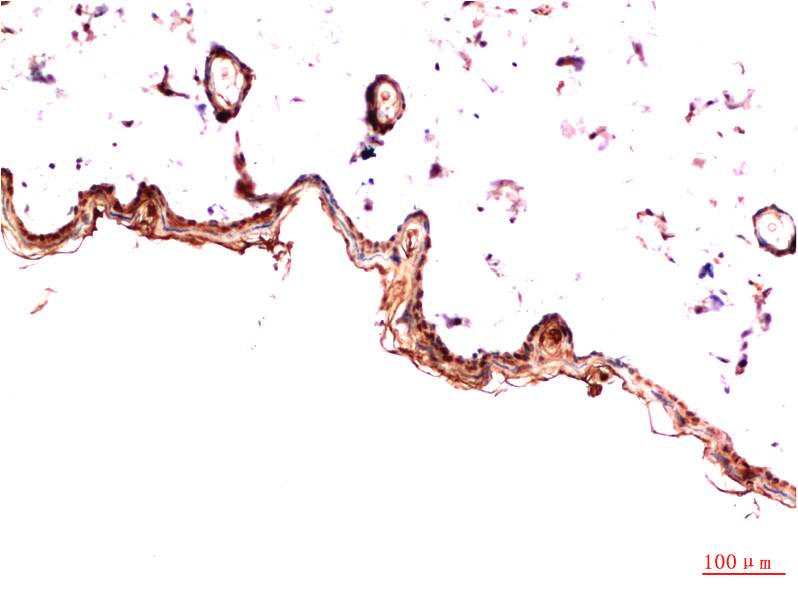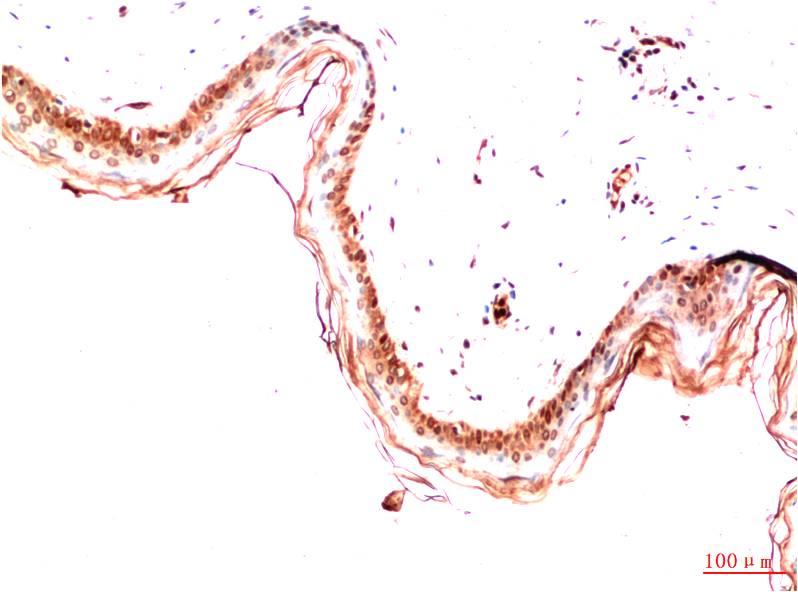

| WB | 咨询技术 | Human,Mouse,Rat |
| IF | 咨询技术 | Human,Mouse,Rat |
| IHC | 1/50-1/100 | Human,Mouse,Rat |
| ICC | 技术咨询 | Human,Mouse,Rat |
| FCM | 咨询技术 | Human,Mouse,Rat |
| Elisa | 咨询技术 | Human,Mouse,Rat |
| Aliases | PDGFRA; PDGFR2; RHEPDGFRA; Platelet-derived growth factor receptor alpha; PDGF-R-alpha; PDGFR-alpha; Alpha platelet-derived growth factor receptor; Alpha-type platelet-derived growth factor receptor; CD140 antigen-like family member A; CD140a antigen; Platelet-derived growth factor alpha receptor; Platelet-derived growth factor receptor 2; PDGFR-2; CD140a |
| Entrez GeneID | 5156 |
| clone | 8B11 |
| Host/Isotype | Mouse IgG1 |
| Antibody Type | Primary antibody |
| Storage | Store at 4°C short term. Aliquot and store at -20°C long term. Avoid freeze/thaw cycles. |
| Species Reactivity | Human,Mouse,Rat |
| Immunogen | Synthetic peptide conjugated to KLH. |
| Formulation | Purified antibody in PBS with 0.05% sodium azide,0.5%BSA and 50% glycerol. |
+ +
以下是关于PDGFRα抗体的3篇参考文献概览:
---
1. **"PDGFRA Activating Mutations in Gastrointestinal Stromal Tumors"**
*Heinrich, M.C. et al. (2003), Science.*
摘要:该研究通过PDGFRα抗体检测,发现胃肠道间质瘤(GIST)中存在PDGFRα激活性突变,揭示了突变导致受体组成性激活,为靶向治疗提供依据。
2. **"PDGFRα Signaling is Critical for Epithelial Morphogenesis and Cardiac Development"**
*Shimizu, A. et al. (1991), PNAS.*
摘要:利用PDGFRα特异性抗体阻断实验,发现PDGFRα信号通路对胚胎发育中的上皮形态发生和心脏形成至关重要。
3. **"Neuregulin 1-erbB Signaling and the Molecular/Cellular Basis of Glial Cell Development"**
*Corfas, G. et al. (2004), Neuron.*
摘要:通过PDGFRα抗体标记,阐明神经胶质细胞分化中PDGFRα与ErbB受体的协同作用,提示其在神经系统疾病中的潜在治疗价值。
---
**备注**:以上文献反映了PDGFRα抗体在疾病机制研究、发育生物学及靶向治疗中的应用。如需全文,建议通过PubMed或期刊官网检索标题获取。
The platelet-derived growth factor receptor alpha (PDGFRα) is a transmembrane tyrosine kinase receptor that plays a critical role in regulating cell growth, differentiation, and tissue development. It belongs to the PDGFR family, which also includes PDGFRβ. PDGFRα binds primarily to PDGF-AA, PDGF-BB, and PDGF-CC ligands, triggering receptor dimerization, autophosphorylation, and activation of downstream signaling pathways such as PI3K/AKT, MAPK/ERK, and JAK/STAT. These pathways influence cellular processes like proliferation, migration, and survival.
PDGFRα antibodies are essential tools for studying receptor expression, localization, and activation in both physiological and pathological contexts. In research, they are widely used in techniques like Western blotting, immunohistochemistry (IHC), and flow cytometry to analyze PDGFRα levels in tissues or cell lines. Aberrant PDGFRα signaling is implicated in cancers (e.g., glioblastoma, gastrointestinal stromal tumors), fibrosis, and cardiovascular diseases, making these antibodies valuable for mechanistic studies and biomarker identification.
Therapeutic PDGFRα-targeting antibodies or inhibitors are also being explored to block overactive signaling in diseases. Additionally, mutations in PDGFRα are linked to genetic disorders, such as familial gastrointestinal stromal tumors. Researchers rely on validated PDGFRα antibodies with high specificity to ensure accurate detection, particularly given structural similarities between PDGFRα and PDGFRβ. Commercial antibodies often target extracellular or intracellular domains, with clone-specific applications in diagnostics or functional assays.
×